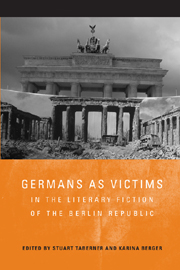Book contents
- Frontmatter
- Contents
- Acknowledgments
- Introduction
- 1 W. G. Sebald and German Wartime Suffering
- 2 The Natural History of Destruction: W. G. Sebald, Gert Ledig, and the Allied Bombings
- 3 Expulsion Novels of the 1950s: More than Meets the Eye?
- 4 “In this prison of the guard room”: Heinrich Böll's Briefe aus dem Krieg 1939–1945 in the Context of Contemporary Debates
- 5 Family, Heritage, and German Wartime Suffering in Hanns-Josef Ortheil, Stephan Wackwitz, Thomas Medicus, Dagmar Leupold, and Uwe Timm
- 6 Lost Heimat in Generational Novels by Reinhard Jirgl, Christoph Hein, and Angelika Overath
- 7 “A Different Family Story”: German Wartime Suffering in Women's Writing by Wibke Bruhns, Ute Scheub, and Christina von Braun
- 8 The Place of German Wartime Suffering in Hans-Ulrich Treichel's Family Texts
- 9 “Why only now?”: The Representation of German Wartime Suffering as a “Memory Taboo” in Günter Grass's Novella
- 10 Rereading Der Vorleser, Remembering the Perpetrator
- 11 Narrating German Suffering in the Shadow of Holocaust Victimology: W. G. Sebald, Contemporary Trauma Theory, and Dieter Forte's Air Raids Epic
- 12 Günter Grass's Account of German Wartime Suffering in Beim Häuten der Zwiebel: Mind in Mourning or Boy Adventurer?
- 13 Jackboots and Jeans: The Private and the Political in Uwe Timm's Am Beispiel meines Bruders
- 14 Memory-Work in Recent German Novels: What (if Any) Limits Remain on Empathy with the “German Experience” of the Second World War?
- 15 “Secondary Suffering” and Victimhood: The “Other” of German Identity in Bernhard Schlink's “Die Beschneidung” and Maxim Biller's “Harlem Holocaust”
- Works Cited
- Notes on the Contributors
- Index
9 - “Why only now?”: The Representation of German Wartime Suffering as a “Memory Taboo” in Günter Grass's Novella
Published online by Cambridge University Press: 05 February 2013
- Frontmatter
- Contents
- Acknowledgments
- Introduction
- 1 W. G. Sebald and German Wartime Suffering
- 2 The Natural History of Destruction: W. G. Sebald, Gert Ledig, and the Allied Bombings
- 3 Expulsion Novels of the 1950s: More than Meets the Eye?
- 4 “In this prison of the guard room”: Heinrich Böll's Briefe aus dem Krieg 1939–1945 in the Context of Contemporary Debates
- 5 Family, Heritage, and German Wartime Suffering in Hanns-Josef Ortheil, Stephan Wackwitz, Thomas Medicus, Dagmar Leupold, and Uwe Timm
- 6 Lost Heimat in Generational Novels by Reinhard Jirgl, Christoph Hein, and Angelika Overath
- 7 “A Different Family Story”: German Wartime Suffering in Women's Writing by Wibke Bruhns, Ute Scheub, and Christina von Braun
- 8 The Place of German Wartime Suffering in Hans-Ulrich Treichel's Family Texts
- 9 “Why only now?”: The Representation of German Wartime Suffering as a “Memory Taboo” in Günter Grass's Novella
- 10 Rereading Der Vorleser, Remembering the Perpetrator
- 11 Narrating German Suffering in the Shadow of Holocaust Victimology: W. G. Sebald, Contemporary Trauma Theory, and Dieter Forte's Air Raids Epic
- 12 Günter Grass's Account of German Wartime Suffering in Beim Häuten der Zwiebel: Mind in Mourning or Boy Adventurer?
- 13 Jackboots and Jeans: The Private and the Political in Uwe Timm's Am Beispiel meines Bruders
- 14 Memory-Work in Recent German Novels: What (if Any) Limits Remain on Empathy with the “German Experience” of the Second World War?
- 15 “Secondary Suffering” and Victimhood: The “Other” of German Identity in Bernhard Schlink's “Die Beschneidung” and Maxim Biller's “Harlem Holocaust”
- Works Cited
- Notes on the Contributors
- Index
Summary
THE PUBLICATION OF Günter Grass's novella Im Krebsgang (Crabwalk) in 2002 signaled the author's return, after thirty-three years, to the subject that had dominated his first four literary works from Die Blechtrommel (The Tin Drum, 1959), to örtlich betäubt (Local Anaesthetic, 1969): the German wartime past. However, whereas Grass's early works depict everyday life under National Socialism and the involvement of “ordinary” Germans in the regime, Im Krebsgang focuses on the sinking of the former Kraft durch Freude (Strength through Joy) ship the Wilhelm Gustloff on 30 January 1945, and, by extension, on the issue of German wartime suffering. The critic Günter Franzen of the newspaper Die Zeit was not alone in expressing his amazement that Grass, of all people, should address this subject in literary form: for Grass, a writer with impeccable left-wing intellectual credentials, to write on a subject often linked to right-wing discourses of German victimhood “was a surprise bordering on a miracle.”
In this chapter, I explore Grass's reasons for choosing to tell the story of the Gustloff in Im Krebsgang, interrogating his assertion that the memory of German wartime suffering was taboo in the postwar era, before going on to examine the wider representation of German wartime experience in the work. I argue that, while Grass's emphasis on German suffering as a “memory taboo” is misguided, other aspects of Im Krebsgang's treatment of the topic remain nuanced and thought-provoking.
- Type
- Chapter
- Information
- Publisher: Boydell & BrewerPrint publication year: 2009

